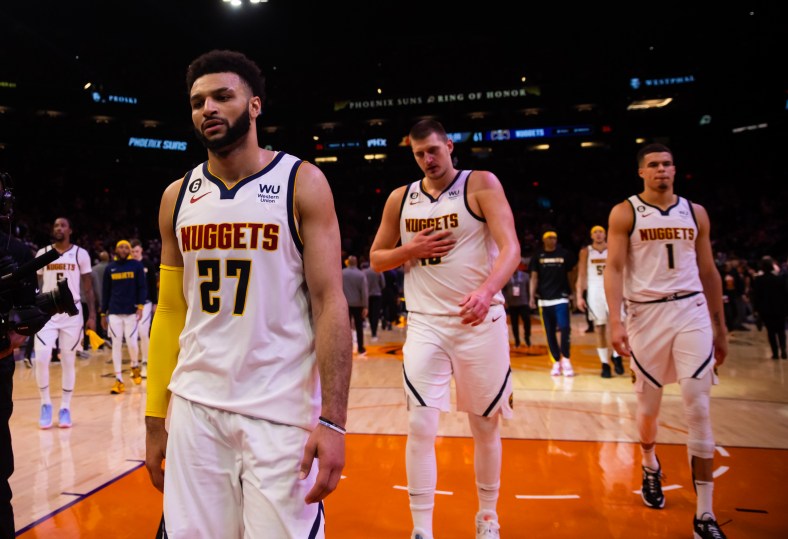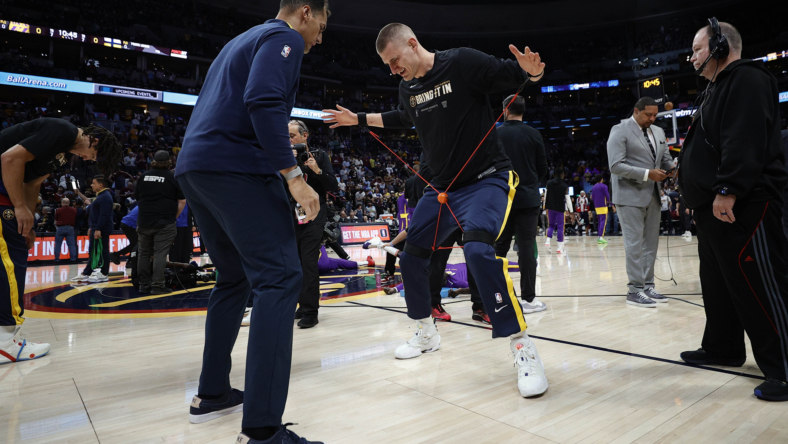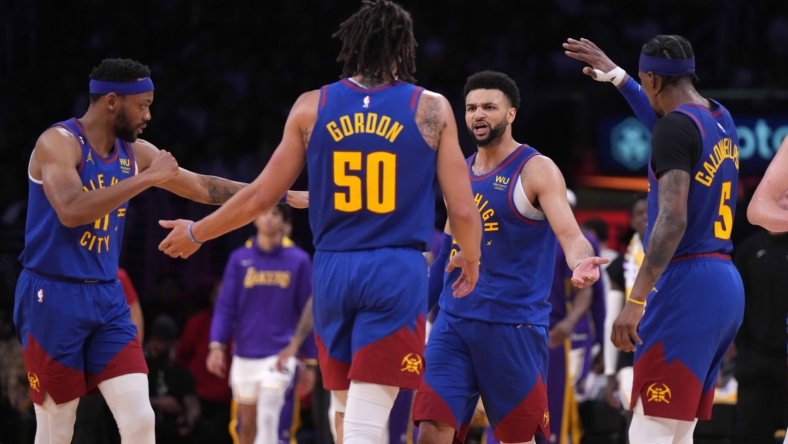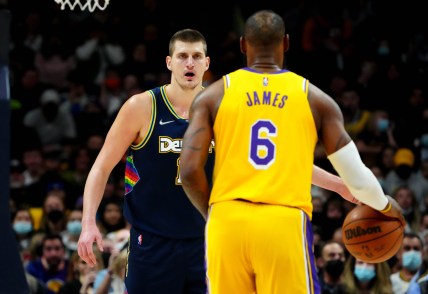
After they walk off the court, the Denver Nuggets’ players might feel tempted to sit by their locker, take a shower or eat the postgame spread. Instead, they all lift weights.
“That’s a big change that we made years ago,” Felipe Eichenberger, the Nuggets’ director of performance and head strength-and-conditioning coach, told Sportsnaut. “It helps our guys. Let’s get it done now. Let’s get it done today.”
Are the Nuggets’ adopting old-school training approaches that contradict the modern load-management era? Hardly. Instead, Denver has spent all season determining the right time to work hard and the right time to work smart. Even following a physically demanding 48-minute game, the Nuggets’ training staff has calculated the players benefit significantly with extending that exercise instead of stopping abruptly.
“The game is pretty hard, so afterwards you can do a harder lift,” Eichenberger said. “Then the next day, you can have a fuller recovery day with more hours.”
The Denver Nuggets will play either the Miami Heat or Boston Celtics in the NBA Finals on June 1, beginning with hosting Game 1 in Denver. The reasons go beyond center Nikola Jokic nearly averaging a triple double all season, the team’s depth or continuity. It also has pointed to how the Nuggets have maximized their chances with having a mostly empty trainer’s room. They have not had a single player miss a postseason contest in a combined 15 playoff games due to injuries.
“Having guys that can play through things is key,” Nuggets general manager Calvin Booth told Sportsnaut. “Those guys work their tail off to try to get good advice on when to rest and when to push through stuff.”
How injuries could have slowed Denver Nuggets’ playoff march

After all, Booth, Eichenberger and Denver Nuggets coach Michael Malone have wondered internally how their recent playoff fortunes would have played out if not for key injuries.
After advancing to the 2020 Western Conference Finals, the Nuggets lost to the Phoenix Suns in the second round of the 2021 playoffs about a month after point guard Jamal Murray tore the ACL in his left knee. A year later, the Nuggets then lost in the first round to the Golden State Warriors with Murray (left knee) and Michael Porter Jr. (back) sidelined.
During that time, the Denver Nuggets declined to push Murray and Porter to return. They considered it unfair to throw either player into a high-stakes playoff game without much ramp up. Despite those players clamoring to play, they also wanted to make sure they had fully healed first.
“We don’t really pressure the players. We know we need to be patient,” Eichenberger said. “We know we shouldn’t take the shortcuts. That comes from Coach Malone, ownership and everybody. They really allow us to take the right path. It might take a little bit longer, but that’s the right path that you have to take.”
That right path involved navigating two parallel tracks.
The first? The Denver Nuggets still followed the latest league-wide trend with handling their players with care during the regular season.
During the team’s training camp in San Diego, Eichenberger filled the players’ lounge with hyperbaric chambers that could fit up to six people in hopes that it could aid post-practice recovery.
In his first season since recovering from his ACL injury, Murray still missed a combined seven games to manage his left knee. He did not play a full set of back-to-back games until January. Though Porter only missed one game for maintenance purposes surrounding is surgically repaired spine, he missed a combined 16 games during the campaign to manage an injured left heel. And Jokic sat for 16 games throughout the season to manage various ailments involving his right wrist, left hamstring and right calf.
“It’s really important to have a big-picture approach because you can get caught up in the emotions of a season, and sometimes those emotions can force you to make poor decisions,” Malone said. “We didn’t feel the need to play our guys an extraordinarily low number of minutes per game. But we also didn’t feel a need where we had to put them in harm’s way by overplaying them. I think, knock-on-wood, that’s allowed us to get to this point in the season.”
The second? The Denver Nuggets also advanced through the playoffs fully healthy because they focused on improving the team’s durability.
Acquiring help for physical drain

Leading into the 2021 trade deadline, the Denver Nuggets acquired a physical forward that could shield Jokic from swarming defenses (Aaron Gordon). After concluding that wasn’t enough during Denver’s first-round loss to Golden State, the Nuggets acquired two wing players known for their toughness (Kentavious Caldwell-Pope, Bruce Brown).
Since then, the Nuggets have become impressed with how all three of those players compete through minor ailments. It helps that Eichenberger has distributed vitamin packs and protein-heavy shakes to players to consume both before and after the game.
“The strength coaches and the training staff are amazing here, and we got guys that work,” Gordon told Sportsnaut. “Nikola is a work horse. He works every single day. So why can’t we? I just try to be the hardest worker on the team, but that’s hard. There are lot of hard workers on this team.”
Jokic set an example with remaining diligent with his postseason workouts. Murray played in Game 2 against the Lakers despite nursing an earache and flu-like symptoms. And Porter played aggressively all season by attacking the basket despite his previous injuries.
“When you have five starters playing through stuff, you’re like, ‘I can’t be out,’” Eichenberger said. “That’s one of the things that helped everybody have the fewest amount of injuries.”
Mark Medina is an NBA Insider for Sportsnaut. Follow him on Twitter and on Instagram.
